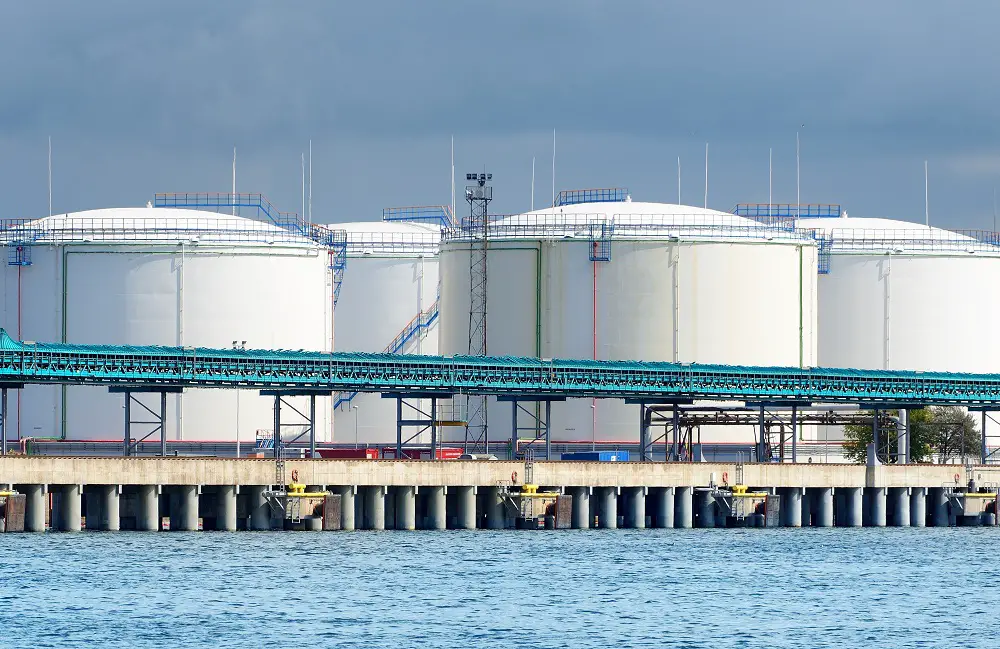Oil as a source of energy has a number of pros and cons compared to renewably generated forms of energy like hydro power, solar, or wind.
Pros of Oil Energy
1. Oil is an Energy-dense Resource
Crude oil as it comes out of the ground has an energy density of 44 MegaJoules (MJ) per kilogram (kg) 1. Lithium-ion batteries have an energy density of 0.954 MJ per kg (265 Watt-hours per kg2, 1 Wh = 3600 Joules).
So by weight alone, you would need about 46kg of lithium ion batteries to hold as much energy as 1kg of crude oil.
2. Oil is a More Transportable Resource
Oil can be put into tankers and transported to remote parts of the world where energy is needed. Renewably generated electricity needs cables to transport the power from where it is generated to where it is needed.
3. Oil is More Easily Stored

Oil can be stored almost indefinitely with virtually no loss in tanks or barrels so it available for use when needed.
4. Oil is a predictable resource
Globally, oil production is predictable (excepting wars, political instability etc). This means an oil-fired power plant will produce a stable, predictable amount of electricity as long as it is kept supplied with oil to burn. The amount of electricity generated by a solar panel or wind turbine is unpredictable, and will vary from hour to hour and day to day, sometimes not generating any electricity at all.
5. Oil is a Profitable Resource
Oil is a non-renewable resource, which means once it has been burnt, it is gone, and can no longer be used to make energy. To continue making energy, oil must continually be bought to ensure production is maintained. This demand for oil creates value for shareholders in oil production companies.
Cons of Oil Energy
1. Cost of Production
Crude oil must be pumped out of the ground, which requires an energy source to power the pumps. After it has been pumped out of the ground, crude oil is then transported by tanker or pumped through a pipeline (both of which require more energy) to a refinery where more energy is used to turn it into various hydrocarbon products that can then be put to use (e.g., gasoline, diesel etc.).
A 2021 study of Energy Return On Investment (EROI) for oil showed that in 2020, just over 15% of oil production was used just in the production of oil3. This amount has been spiraling out of control over recent years and is forecast to increase to 25% by 2024. In other words, within 2 years, the world will be using a quarter of the energy produced from all oil just to keep producing oil; This process is called energy cannibalism.
2. Cost of Oil Exploration
As oil continues to be pumped from the ground, there is less of it available to be pumped from the ground. Oil companies are having to prospect in more and more remote and inhospitable parts of the globe to find new oil reserves as existing ones dry up. This increases the financial and energy cost of continued oil exploration, further exacerbating the problem of energy cannibalism.
3. Atmospheric Pollution or Global Warming
Burning oil releases vast quantities of carbon dioxide into the atmosphere, amongst other toxic and greenhouse gases. Scientists now overwhelmingly agree that extreme weather events (floods, storms, blizzards etc) being experienced across the globe are occurring more regularly due to climate change driven by carbon dioxide emissions due to human activity.4
4. Environmental Pollution
Oil is a toxic and hazardous substance and can kill plants and animals. Leaks from remote pipelines can cause extensive damage before they are found and rectified. A study of the interprovincial pipeline in Canada showed that between 1962 and 1996 over 50,000,000 litres of oil leaked into the environment from that one pipeline alone5.
5. Dependence on Oil-producing Countries
For people who live in a country that does not have much or any natural oil resources, they have to buy their oil in from other countries, which creates political leverage that may be used to disadvantage the country buying the oil.

